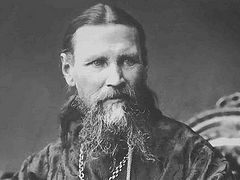On June 14, 1990, the rite of canonization of Archpriest John of Kronstadt by the Moscow Patriarchate was celebrated in St. John’s Monastery in St. Petersburg.
The Kronstadt pastor was given to the Church at a difficult time. He foresaw the revolution, and the war, and the sea of blood.
The Lord endowed him with many gifts of the Holy Spirit. His words penetrated into and healed the soul. Up to five to seven thousand people would gather for the Divine Liturgy in St. Andrew’s Cathedral in Kronstadt where Fr. John served for fifty-six years. People would come to Fr. John for general confession and they publicly shouted out their sins. According to their testimonies, their passions stopped tormenting them after this.
The living word of the Righteous John of Kronstadt is still accessible to us. A hundred years later, he addresses those of us living now. Spiritual values and the spiritual life itself haven’t changed, and their benchmark is the proper treatment of others, whether known or unknown to us.
***
We need podvigs for the formation of our inner man, for the mortification of the passions nesting inside, to development ourselves to that measure of the stature of the fulness of Christ (Eph. 4:13), when we become capable of accepting and bearing the Kingdom of God in our hearts. God is always with us, at the door of our heart, as it says: Behold, I stand at the door, and knock (Rev. 3:20); but is the heart always able to receive Him? We are shown by books and examples that podvigs are an auxiliary force for our perfection, to purify our hearts by them, so as to be able to receive the Kingdom of God, that is, Christ Himself within it.
***
Do you know the troparion to the Great Martyr Theodore the Tyro? “He was offered as a sweet bread to the Trinity.” What does this mean? How do you understand these words? For bread to be sweet and pleasant, first of all, the flour must be well sifted, separated from any impurity, from everything unsuitable, for the bread to be pure and delicious. In the same way, for our heart to be a sacrifice pleasing to God, we must first cleanse it from the passions that are to be found in it, we must uproot them, and then it will be acceptable.
***
Do you really think that our vigilance or any podvigs are powerful and sufficient to give us boldness before the Holy Chalice? Do you remember the thief? One sigh of sincere repentance, simple faith in the merits of the Crucified One—this is our justification, not our illusory podvigs. Of course, we have to labor, but not such that we see and imagine our justification and dignity are in these podvigs. A heart that is broken and humbled God will not despise (Ps. 50:19).
***
We have to force ourselves; you hear, “you have to force yourself” for the benefit of others and for the glory of God.
***
Don’t you consider absent-mindedness a sin? It’s a loss of attention, and the Savior referred to it when He spoke about the seed that fell on the way, and when He said to the Apostle Peter: Simon, Simon, behold, Satan hath desired to have you, that he may sift you as wheat (Lk 22:31).
***
Even Solomon in all his glory was not arrayed like one of these. Wherefore, if God so clothe the grass of the field, which to day is, and to morrow is cast into the oven, shall he not much more clothe you, O ye of little faith? How obvious is the truth of the word of God: Seek ye first the Kingdom of God, and His righteousness; and all these things shall be added unto you (Mt. 6:29-30, 33). I’ve experienced this myself: Since the time I began earnestly seeking and taking care only to please the Lord in prayer and works of mercy to others, I have almost no need to take care for myself, that is, for my eternal needs. By the grace of God, kind people clothe me, shoe me, and host me, and it would be considered an offense if I didn’t accept their zeal.
***
And this is how I understand it: Let your light so shine before men, that they may see your good works, and glorify your Father Which is in Heaven (Mt. 5:16). Let people see your good works, and through this praise the Lord, and have a living example for themselves, a living motivation to do good. This is who you have to hide your good deeds from! [Batiushka pointed to his own heart]. Conceal everything from it; let not thy left hand know what thy right hand doeth (Mt. 6:3). The “left hand” here means your conceit and vanity.
***
Why should we look into the future? Sufficient unto the day is the evil thereof (Mt. 6:34). Let us surrender, like children, to our Heavenly Father, for He will not suffer you to be tempted above that ye are able (1 Cor. 10:13). You will only torment yourself with suspicion, and you won’t help the cause; you’ll even damage it by imagining evil in advance where perhaps there is none. If only we could not commit evil, but let them do it to us, if the Lord permits.
From the book: Conversations of Archpriest John of Kronstadt with Abbess Taisia, Sretensky Monastery, 2022





